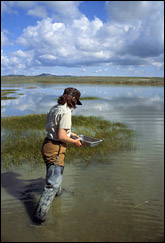Dear Umbra,
I am in the midst of getting my master’s in environmental science and policy. I am so sick of reading and researching — I just want to get out and do something. My thesis is on composting (of industrial and municipal wastes), but my true love is water. While I have a pretty good background in everything from chemistry to physics, I see myself as the “master of none.” Essentially, what I want to ask you is: What should I do when I grow up? What is the best water job out there that helps the environment, or at the very least, where do I start looking? You only have one life, and I want mine to count!
Soon-to-be Graduate Stephanie
Green Bay, Wis.
Dearest Stephanie,
Back in my college days, I had the pleasure of hearing African-American Studies icon Henry Louis Gates Jr. speak. During the Q & A session, a student asked him the same question: What is the best job for me to do? I think the answer Gates gave applies universally: Do what you love.

Do what you love.
Photo: U.S. Fish & Wildlife Service.
I know it sounds cheesy, but it’s true. If you are able to learn what you love to do day to day, and get paid for it, you will be a lucky, happy woman who is improving the world. If you take someone else’s career path, no matter how eco-beneficial, you won’t be doing anyone any favors. You’ll be bad at your job, and cranky.
I’m sorry to give you such a frustrating answer. It’s hard to know what we love to do, much less how it fits into the economy. Believe it or not, all the tips you’ve gotten (I hope) about using school career-counseling services, interning, volunteering at nonprofits, setting up informational interviews with people whose jobs you covet, and discussing the future with your professors is actually good advice.
Those self-help exercises and books like What Color Is Your Parachute can also be helpful, even just as a way to focus your thoughts. If your career center has few environmental resources, you might check out websites like The Environmental Careers Organization or Environmental Career Opportunities.
A further clue I can give you from my peripatetic employment journey is to remember that the character of daily work is as important as the subject matter. If you hate being wet, stream restoration is not for you; but perhaps you love numbers and fluorescent lights, in which case you might have a fine future in ocean-current computer modeling. You could spend months on ships looking at whales, or join a water utility as a resource-management expert. Perhaps you’ll become a grassroots river-cleanup guru, or maybe you’ll invent the world’s most efficient faucet.
The most important thing to remember is that no choice you make will be irrevocable or wrong. So go on — get excited for your wonderful, mysterious life.
Congratulatorily,
Umbra

